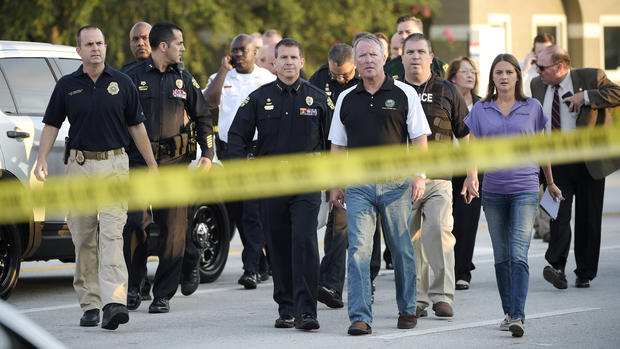San Bernardino shooting: Another all-too-familiar tragedy
We begin this Sunday with the pictures of 14 people -- victims of Wednesday's shootings in San Bernardino. They are, of course, more than just faces. They had families, friends, lives. The investigation goes on, as does the mourning. Here's Lee Cowan:
By the time the last shots rang out in San Bernardino on Wednesday, it had been decided how an unfortunate number of innocent families were going to be spending the holidays: grieving for losses no one could -- or should -- understand, let alone tolerate.
Yet here we are again, searching for answers when even the questions seem abhorrent in their familiarity.
The answer, unsettling as it may be in this case, seems for the moment to be pointing in one direction.
"We are now investigating these horrific acts as an act of terrorism," said David Bowdich, assistant director of the Federal Bureau of Investigation's Los Angeles office,
This time the alleged murderers were a young couple, newly married with a new baby.
The target: the husband's co-workers at a holiday gathering -- some sending out frantic text messages.
"Pray for us. I am locked in an office."
Their killings took just minutes.
Hours later, they would be dead, too: Syed Farook and his wife, Tashfeen Malik, shot to death in their rented getaway car.
Among their victims: Michael Wetzel, father of 6; Daniel Kaufman, who ran a coffee shop; and Nicholas Thalasinos, who leaves behind his wife.
"Just my whole life has been basically turned upside-down," Jennifer Thalasinos said. "He just had an enormous heart."
- San Bernardino shooting victims include father of six
- GALLERY: San Bernardino shooting victims
- San Bernardino residents continue to mourn victims
At first it seemed like a workplace shooting, but then came the discovery the killers had left behind a bomb. It didn't go off.
Back at the couple's home, investigators found more guns and more bombs. Just what were they up to?
"Clearly they were equipped and they could have continued another attack," said San Bernardino Police Chief Jarrod Burguan. "We intercepted them before that happened, obviously."
Farook, a U.S. citizen, was not on any watch lists, although he had been in contact with at least one person of interest to the FBI.
His Pakistani-born wife, Tashfeen Malik, who had come to the U.S. from Saudi Arabia on a fiancee visa, took to Facebook to pledge her allegiance to the leader of ISIS just before Wednesday's massacre.
That said, FBI Director James Comey says there is no evidence ISIS ordered the attack, and nothing seems to indicate the couple was part of a larger terror network.
- More details revealed about San Bernardino shooting suspects
- Why would a young mother open fire on a holiday party?
- San Bernardino suspect's sister breaks her silence
"There's much about this that doesn't make sense, even for those of us who do this for a living," Comey said.
"To have all this extensive planning and then use it for the holiday party of the co-workers, is the odd part of this case," said Jeffrey Simon, an expert on terrorism and political violence. He wonders, like the rest of us, will we ever really feel safe?
"Every time we think we have it down pat in terms of who may be the type of terrorist who may be likely suspects, you can get these things out of left field -- a husband-and-wife team," said Simon.
It's of course not the first time a family has conspired against innocents. It was two brothers, after all, who planned the terrorist bombings at the Boston Marathon more than two years ago.
But it's the frequency of mass casualty attacks, inspired by terrorism or not, that has left us all on edge.
It's a dreadful calendar of violence. In fact, by one count, there have been 353 mass shootings in the U.S., with four or more victims, this year. On average that's more than one a day.
"We should never think that this is something that just happens in the ordinary course of events," said President Obama, "'cause it doesn't happen with the same frequency in other countries."
Historian Walter Isaacson worries not just about more attacks, but how it stains the welcome mat this country has so often laid out.
"I think a lot of things are being endangered by this event, and one of them is our basic and fundamental creed that we're an inclusive nation," he said.
Racial and religious prejudice is nothing new in America. But on the positive side, Isaacson says, we've usually found our footing.
"I think we're in a very dangerous time," said Isaacson, "but I think we've gone through everything from civil rights movements to civil wars, where there was a lot of unrest; where there were church bombings; where there were shootings and lynchings. I think that we have to not overreact, and we have to say, 'If we stick to the fundamental values embedded in our Constitution and the DNA of our nation, we're not going to let these things unravel who we are.'"
Perhaps we're not unraveled, but the country is frayed, and divided over just what to do.
Guns are a constant. In fact, holiday shoppers bought a record number of them this past Black Friday.
The procession of grief is almost guaranteed to continue. More funerals, more candlelight vigils.
Perhaps most unsettling? There's an alarming sameness to it all, when these dreadful events should be the horrific exception.
